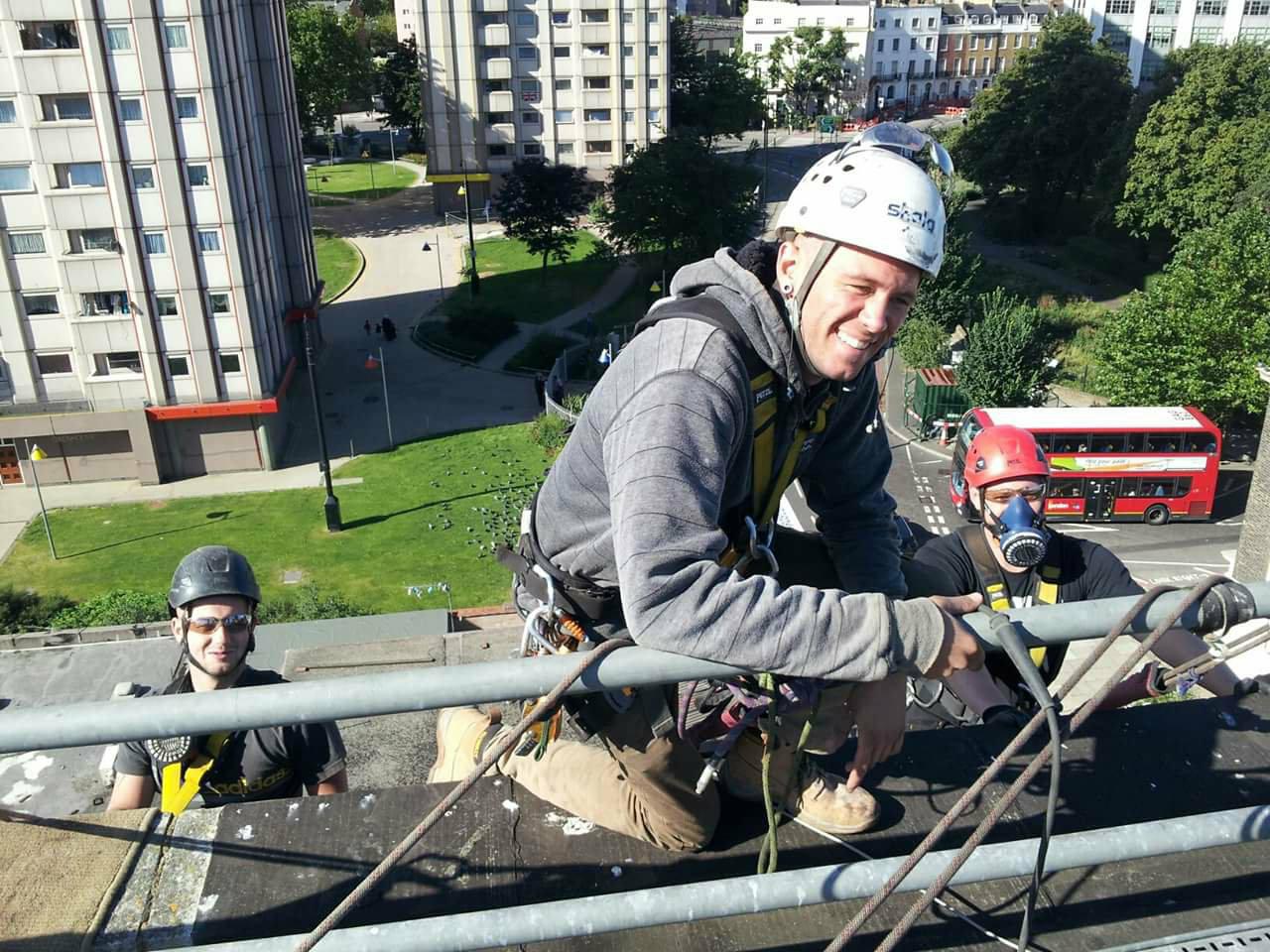
We get a lot of questions from new rope access technicians about finding work. Many don't know where to start and are worried that they won't be able to find full time work because they don't have any other trades, skills, or experience. We would love to guarantee jobs for everyone but unfortunately, that's out of our hands. However, we can share stories of rope techs that have started out in similar scenarios and have successfully fostered a thriving career for themselves. One person I thought of right away, was our good friend Barry, who is currently a L3 Rope Access Supervisor working in Ft. Mac.
We had a chance to sit down with Barry over yummy tacos to chit chat about what he is doing these days and to reminisce on how far he's come. Barry and Tim, one of the PacRopes' owners, started in the high rise maintenance sector together over a decade ago now. They each have taken their careers on different paths and I thought it would be a great idea for Barry to share his story here on this blog for any new and aspiring rope techs.
How did you get your start in Rope Access and why?
I was living in Vancouver and working in kitchens. A friend of mine, who was washing windows, told me about his job and offered to get me started. I ended up doing some high rise painting first and then went into window cleaning that winter for about 6 months.
How did you go from window washing to being a L3 Supervisor in the oil and gas industry?
After window washing, I moved to Toronto to get my IRATA certification and worked a bunch of miscellaneous industrial jobs there. When the Olympics came to Vancouver, I moved back and managed to get some work rigging, hanging banners, etc. Right after that, opportunities came up at Canada Place and that's around the time I went and got my IRATA L2 at Ropeworks in Reno. Then BC Place was the next big rope access job in Vancouver so I worked there before moving to the UK. I spent 2 years there doing cavity wall insulation and being a Construction Supervisor. The company I was working for offered to put me through my L3 training so I was pretty lucky on that end. Then after about 2 years in the UK, I decided it was time to come home, imported the love of life (from UK), worked on the Portmann Bridge with you guys, then went to Fort Mac. That's it in a nutshell!
Most techs who get into rope access aim to be a L3 Supervisor as their end goal. Since you've been a Supervisor for almost 6 years now, what's the next step?
Currently, I just finished my 1st year pipefitting program at BCIT. That trade interests me the most and I figure with these added skills I can do more than just supervise the trades. But, I'm not bored at all doing my job. I didn't start with the goal to be a L3 Supervisor. Wasn't something I thought about doing. In fact, I wasn't that interested in upgrading. I just fell into supervising and found that I love it. Human psychology was always an interest of mine and I find it plays out a lot when supervising. You're always dealing with people's emotions, thoughts, and motivations. I like analyzing why people do what they do and using people's strengths to bring the team together.
Any advice for people who are training?
Don't rush the levels. Wait until you're ready. You'll know you're ready when you're comfortable with everything you're doing on site. Make sure you know and study up on your maneuvers, theory, and TACS. It's hard to understand but it's not always about the paycheque. If you rush to do your upgrades and you're not ready, you'll end up wasting a lot of your time and money.
What's your favorite part of being on a job site?
I like the people I work with. Personalities are interesting and over the years, I've got to meet lots of cool people. The people I work with right now are like family to me. We've been through and accomplished a lot together.
What don't you like about your job?
The travelling. I live in Vancouver still so travelling back and forth each shift gets tiring.
What is the biggest piece of advice for a new L1 rope tech who is looking for a job?
Getting the job is half of it. There is a lot of work out there and eventually, you will get work somewhere. But the more important thing is what you do once you have the job. Once you get a job, don't get too comfortable right away. Don't think that you deserve the job. Work for it. Show up on time, work hard, and have a positive attitude. Those three things make all the difference. Employers will trust you and will ask you to come back job after job. With rope access, everything is based on contracts, which aren't always reliable. Something will happen and the job you thought you had for 1 month or 6 months will fall through. Most people will freak out but you have to get used to it. It's the nature of this industry. Expect to not have full time work. But, if you show up on time, work hard, and have a positive attitude, when things pick up again, employers will be calling you again because they know they'll want someone like you on their team. Make sure you leave a good impression wherever you are. This industry is small so if you leave a bad taste in one company, I'm sure other companies you're applying to will also hear of it.
And on the flip-side, what is your biggest piece of advice for a seasoned tech Iike yourself?
Never stop learning. I've just finished my second re-certification and I'm still learning. There are a lot of different perspectives and many different possibilities for rope access to be applied. Just because you do things one way doesn't mean it's the best or only way. Keep an open mind and continue learning.
Where do you see the future of Rope Access?
There is so much more opportunity and growth out there. Each year, more companies are starting to use rope access but it's definitely not saturated yet. There are still many doors to open. I've been a rope tech for over 10 years now. When I first started, everyone was looking for more L3's. Over a decade later, it's still the same message. Everyone is still needing more L3's.
Thanks Barry for taking the time to chat with us!! His story is inspiring to me because it proves that dedication to a goal and perseverance through the unknown can lead to success! Seizing opportunities that might be risky or not ideal might open doors to experiences you won't forget. Check out more rope tech stories below!




